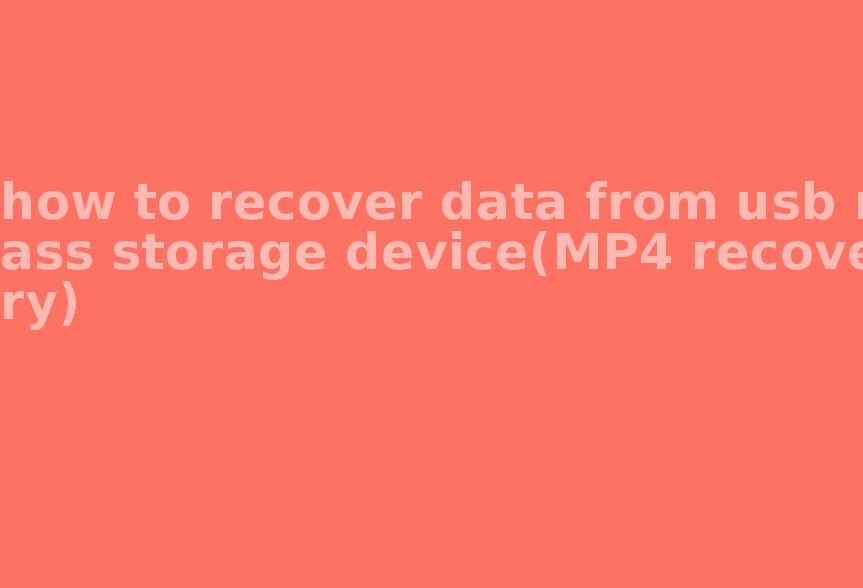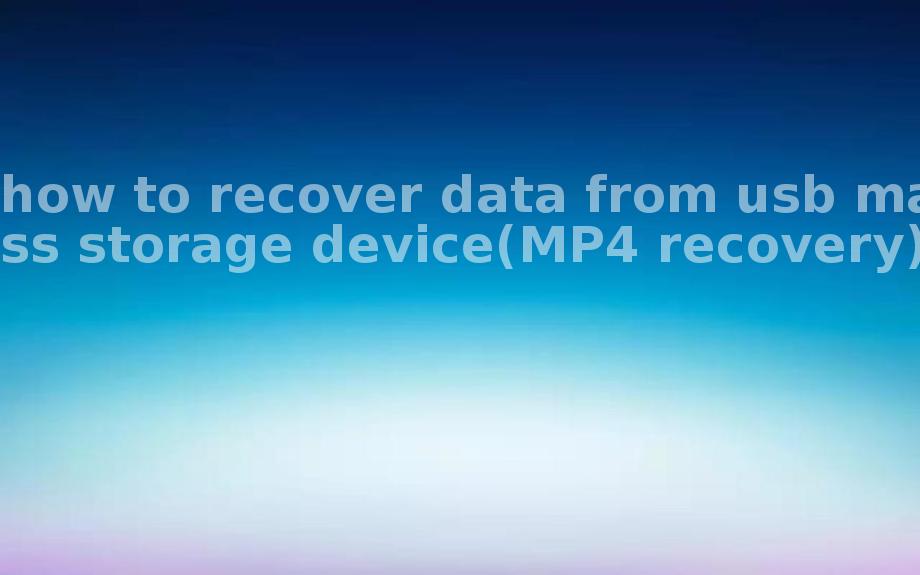how to recover data from usb mass storage device(MP4 recovery)
2023-10-20 16:50 302
Part I. Overview of the context in which the document was recovered:
USB mass storage devices, like MP4 players, are widely used for storing and transferring data such as music, videos, and documents. These devices are portable and convenient, making them popular among users. However, there are several situations where data can be lost or inaccessible on USB mass storage devices:
1. Accidental deletion: Users may accidentally delete files from their MP4 players while trying to manage or organize their content.
2. Formatting: If the MP4 player is formatted without a proper backup, all the data on it will be erased, leaving the user without access to their files.
3. Virus or malware attack: USB mass storage devices can also be vulnerable to viruses or malware, which can corrupt or delete the files stored on them.
Part II. Causes of data loss on MP4 players:

1. Physical damage: Dropping the MP4 player or exposing it to extreme temperatures or moisture can lead to physical damage and make the stored data inaccessible.
2. File system issues: Corruption in the file system of the MP4 player can cause data loss or make the device unable to read the files.
3. Power failure during data transfer: If the power supply is interrupted while transferring data to or from the MP4 player, it can result in data loss or file corruption.
Part III. Solution to recover data from USB mass storage devices (MP4 recovery):
1. Stop using the device: When data loss occurs, it is crucial to stop using the MP4 player immediately to prevent further overwriting of the lost data.
2. Use data recovery software: There are various data recovery software available that can help recover lost or deleted files from USB mass storage devices. Some popular options include Recuva, EaseUS Data Recovery Wizard, and Stellar Data Recovery.
3. Connect the MP4 player to a computer: Use a USB cable to connect the MP4 player to a computer and ensure it is recognized as a removable storage device.
4. Run the data recovery software: Launch the chosen data recovery software and select the USB mass storage device from the list of available drives.
5. Scan for lost files: Initiate a deep scan to search for lost or deleted files on the MP4 player. The scanning process may take some time depending on the size of the device and the amount of data stored on it.

6. Preview and recover files: Once the scanning is complete, preview the found files to ensure their integrity. Select the files you want to recover and choose a safe location to save them.
Part IV. Types of other files that can be recovered from USB mass storage devices:
In addition to MP4 files, data recovery software can also recover various other file types, including:
1. Photos: Recover deleted or lost images in formats like JPEG, PNG, or RAW.
2. Documents: Retrieve lost documents, spreadsheets, presentations, PDFs, and other office files.
3. Music: Restore deleted or corrupted audio files in formats like MP3, WAV, FLAC, or AAC.
The software can typically recover a wide range of file types from the USB mass storage device.
Part V. Related FAQ:
1. Can I recover data from a physically damaged MP4 player? Yes, data recovery from physically damaged MP4 players is possible. However, it is recommended to seek professional help as physical damage may require specialized tools and techniques.
2. Can I recover data if the MP4 player is formatted? Yes, data recovery software can recover files even after the MP4 player has been formatted. The software scans the storage device for traces of the lost data and allows you to recover it.
3. Can I recover data from a virus-infected MP4 player? Yes, data recovery software can recover files from virus-infected MP4 players. However, it is essential to ensure that the MP4 player is clean of any viruses before connecting it to the computer to avoid potential risks and further spread of the malware.









